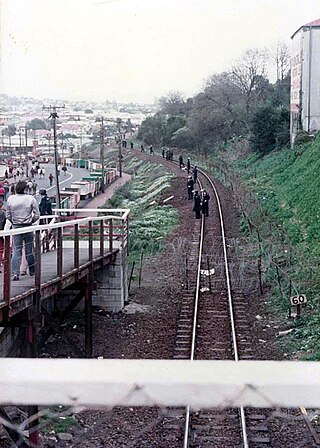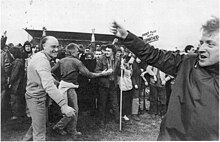
Racial segregation is the separation of people into racial or other ethnic groups in daily life. Segregation can involve the spatial separation of the races, and mandatory use of different institutions, such as schools and hospitals by people of different races. Specifically, it may be applied to activities such as eating in restaurants, drinking from water fountains, using public toilets, attending schools, going to films, riding buses, renting or purchasing homes or renting hotel rooms. In addition, segregation often allows close contact between members of different racial or ethnic groups in hierarchical situations, such as allowing a person of one race to work as a servant for a member of another race. Racial segregation has generally been outlawed worldwide.
Reverse discrimination is a term used to describe discrimination against members of a dominant or majority group, in favor of members of a minority or historically disadvantaged group.

The 1981 South African rugby tour polarised opinions and inspired widespread protests across New Zealand. The controversy also extended to the United States, where the South African rugby team continued their tour after departing New Zealand.

Rewi Alley was a New Zealand-born writer and political activist. A member of the Chinese Communist Party, he dedicated 60 years of his life to the cause and was a key figure in the establishment of Chinese Industrial Cooperatives and technical training schools, including the Peili Vocational Institute. Alley was a prolific writer about 20th century China, and especially the communist revolution. He also translated numerous Chinese poems.
The Polynesian Panther Party (PPP) was a revolutionary social justice movement formed to target racial inequalities carried out against indigenous Māori and Pacific Islanders in Auckland, New Zealand. Founded by a group of young Polynesians on 16 June 1971, the Panthers worked to aid in community betterment through activism and protest. Besides peaceful protests, they helped provide education, legal aid, and other social resources, such as ESOL classes and youth community programs. The group was explicitly influenced by the American Black Panther Party, particularly Huey Newton’s policy of black unity through his global call-to-action, as well as his ideology of intercommunalism. The movement galvanised widespread support during the Dawn Raids of the 1970s, and greatly helped contribute to the modern pan-Polynesian ethnic identity in New Zealand called Pasifika.

Halt All Racist Tours (HART) was a protest group set up in New Zealand in 1969 to protest against rugby union tours to and from South Africa. Founding member Trevor Richards served as president for its first 10 years, with fellow founding member John Minto then serving as president until South Africa dismantled apartheid in the early 1990s.
The Citizens Association for Racial Equality (CARE) was a New Zealand organisation that fought against racism towards minority groups in New Zealand.

Geoffrey John Chapple is a New Zealand author and journalist. He conceived and founded Te Araroa, a walking track the length of New Zealand.

Rewi Manga Maniapoto (1807–1894) was a Ngāti Maniapoto chief who led Kīngitanga forces during the New Zealand government Invasion of Waikato during the New Zealand Wars.
Chinese Industrial Cooperatives (CICs) were organisations established in China during the Second Sino-Japanese War (1937–1945) to support China's war effort by organizing small-scale grassroots industrial and economic development. The movement was led by the Chinese Industrial Cooperative Association, founded in 1938 by foreign and Chinese activists. Its international arm the International Committee for the Promotion of Chinese Industrial Cooperatives was founded in 1939 in Hong Kong to promote cooperatives in China.

The China–New Zealand relations, sometimes known as Sino–New Zealand relations, are the relations between China and New Zealand. New Zealand recognised the Republic of China after it lost the Chinese Civil War and retreated to Taiwan in 1949, but switched recognition to the People's Republic of China on 22 December 1972. Since then, economic, cultural, and political relations between the two countries have grown over the past four decades. China is New Zealand's largest trading partner in goods and second largest trading partner in services. In 2008, New Zealand became the first developed country to enter into a free trade agreement with China. In recent years, New Zealand's extensive economic relations with China have been complicated by its security ties to the United States.
George Aylwin Hogg was a British adventurer. He read economics at University of Oxford.
Censorship in New Zealand has been present since around 1850 and is currently managed by the Classification Office under the Films, Videos, and Publications Classification Act 1993.

Robert Sullivan is a Māori poet, academic and editor. His published poetry collections include Jazz Waiata (1990), Star Waka (1999) and Shout Ha! to the Sky (2010). His books have a postmodern quality and "explore social and racial subjects, and aspects of Māori tradition and history."

Netball is one of the most popular women's participation sports in South Africa. The sport is also played by a large number of men. It exists in a culture where sport plays an important public and social part of life. The history of South Africa's netball involvement mirrors that of other sports played in the country like rugby union. During the apartheid era, there were many netball facilities available for whites to use, and fewer for people from other race groups. Funding issues and gender issues did not help bridge this gap.
Kathleen Anne Baird Hall was a New Zealand nurse and Anglican missionary who served in China. She was born in Napier, Hawke's Bay, New Zealand on 4 October 1896.
Rugby union is the national sport of New Zealand with the All Blacks as the national team. The All Blacks are made up of many races and cultures, and seven of the fifteen starters in the 2011 Rugby World Cup final were of Polynesian descent. However, although the national team has a long history of success, it also has on occasion been the subject of racial issues. On the international stage there has been controversy in the tours of and by South Africa, the most famous of which was the 1981 tour by South Africa. These tours drew much international criticism as many states were boycotting South Africa due to apartheid. On the domestic stage there have been issues of racism in the Super Rugby competition. There have also been some instances of racism in college rugby and club rugby. Racism is quite a serious human rights issue in New Zealand, which was highlighted in the Universal Periodic Review by the United Nations Human Rights Council.
Bernice Elizabeth Shackleton was a New Zealand journalist and writer.
Kathleen Pih–Chang (1902–1991) was a Chinese–born New Zealand medical doctor and the first Chinese person to graduate as a doctor from the University of Otago in 1929.
Judith Shelby Siers is a New Zealand writer and historian. In 2008 she won a Montana New Zealand Book Award.











